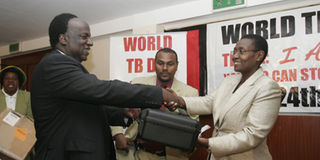Milestone for TB patients with HIV

A microscope to assist in TB research is presented during 2008 World TB Day, earlier in the year. Current data shows that Mombasa, Nairobi, Isiolo, Kisumu and Embu counties have the largest populations of people suffering from the disease. PHOTO | FILE | NATION MEDIA GROUP
A new study on diagnosis of Tuberculosis (TB) among HIV positive patients is expected to come up with a more efficient way of detecting and managing the respiratory infection.
The study known as FujiLAM is being conducted by researchers from Doctors without Borders (Médecins Sans Frontières (MSF).
It is expected to transform how TB is detected and managed especially among HIV patients who are more vulnerable to the respiratory disease.
Homa Bay County, which leads in HIV infections at 19 per cent, is among regions the study is being conducted in Africa.
Other African counties include Mozambique, Uganda and South Africa.
People living with HIV are more likely than others to become sick and probably die from TB.
Some of them only detect TB when it is too late and they are overwhelmed.
This is because HIV virus weakens their immune system, which makes it harder for the body to fight TB germs.
MSF Project Co-ordinator Homa Bay Dorothy Esonwune said timely and accurate diagnosis of TB has been a major challenge to doctors.
Some methods of diagnosis of the disease include use of GeneXpert system, chest X-ray, TB LAM test and sputum test.
All these methods consume time and require specialised training.
The new study which began in September 2020 is aimed at coming up with a simple and more efficient way of detecting the disease.
The Use of Urine
FujiLAM uses urine to detect TB among HIV patients and the results can be produced within one hour.
In addition, the test can be conducted in rural health facilities and done by trained community health volunteers.
'If proven effective, the method will enhance early detection of TB in both rural and urban health facilities,' Ms Esonwune said.
She said the findings will be made public once the study is complete.
'We are optimistic that it will enhance efficiency in early diagnosis of TB,” said Ms Esonwune.
During the World TB Day celebrations on Friday, Homa Bay County was found to have 2020 people suffering from the disease.
Twenty five patients were found to be suffering from drug resistant TB and are undergoing medication.
Dr Emetole Earnest, the medical team leader at MSF in Homa Bay County, said many HIV patients contract TB as an opportunistic infection.
He said projects that MSF has been engaged in has helped lower the infection rates of TB.
'The burden of TB has been on a downward trajectory because of the intervention put in place to suppress the disease,' the medic said.
County Health Executive Prof Richard Muga said the burden on TB is based on high HIV infection rate.
He said the county was on the edge of containing the disease in the 1990s but the rise in HIV infections derailed all the gains made in the fight against the disease.





